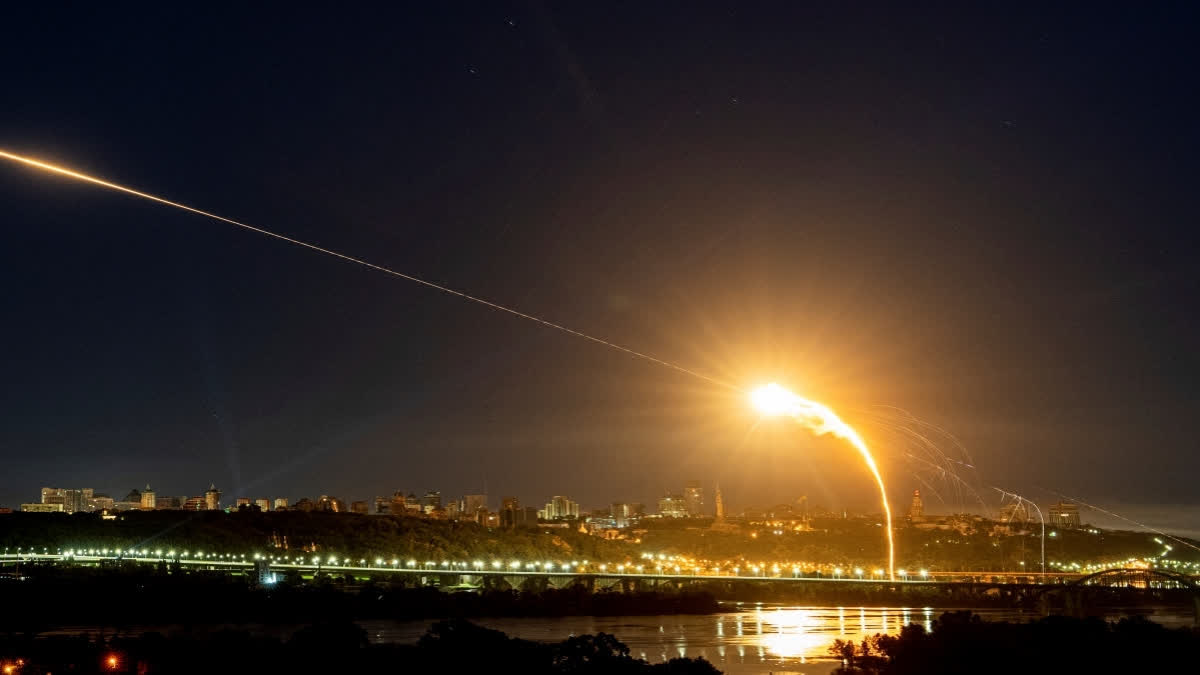Kyiv(Ukraine):In a concerning escalation of tensions between Russia and Ukraine, Russian forces unleashed intense strikes with drones and missiles overnight Wednesday, damaging critical port infrastructure in southern Ukraine, including grain and oil terminals, and wounding at least 12 people, officials said. The bombardment crippled significant parts of export facilities in Odesa and nearby Chornomorsk and destroyed 60,000 tons of grain, according to Ukraine's Agriculture Ministry.
This comes days after President Vladimir Putin pulled Russia out of its participation in the Black Sea Grain Initiative, a wartime deal that enabled Ukraine's exports to reach many countries facing the threat of hunger. It also followed a vow by Putin to retaliate against Kyiv for an attack Monday on the crucial Kerch Bridge linking Russia with the Crimean Peninsula, which the Kremlin illegally annexed in 2014.
Chaos in Odesa as Russia pounded demands: Putin said on Wednesday that Russia could return to the deal if the West offers Russian banks involved in servicing payments for the country's agricultural exports immediate access to the Society for Worldwide Interbank Financial Telecommunications (SWIFT) payment system, adding that Moscow wants its conditions met, not some promises and ideas." The Russian leader also listed other Russian demands, including a lifting of insurance and shipping restrictions that affect Russian agricultural exports and a resumption of Moscow's export of ammonia to Odesa via a pipeline, a section of which was blown up last month.
He said Moscow has shown miracles of patience and tolerance by repeatedly extending the grain deal while Western nations used it shamelessly enrich themselves," violating its declared goal of helping relieve hunger in poor countries. Further raising the stakes, the Russian Defense Ministry issued a statement that Moscow has declared international waters in northwestern and southeastern parts of the Black Sea "temporarily dangerous" for shipping. That follows Ukraine's pledge to continue grain shipments despite the Russian pullout from the deal.
The ministry warned it will see any incoming vessel laden with military cargo starting from midnight. "The countries whose flags those ships will fly will be seen as involved in the Ukrainian conflict on the side of the Kyiv regime," it said. The White House on Wednesday warned that the Russian military is preparing for possible attacks on civilian shipping vessels in the Black Sea.
"Our information indicates that Russia laid additional sea mines in the approaches to Ukrainian ports," White House National Security Council spokesman Adam Hodge said in a statement. "We believe that this is a coordinated effort to justify any attacks against civilian ships in the Black Sea and lay blame on Ukraine for these attacks."
Grain suspension deepens the crisis: Ukraine's Agriculture Ministry, citing experts, estimated it would take a year to restore the facilities damaged Wednesday. The destroyed grain was supposed to have been loaded onto a vessel and sent through the grain corridor two months ago, the statement said.
"Such attacks by Russian terrorists are not only affecting our country but also global stability, Ukrainian President Volodymyr Zelenskyy said during a briefing with the visiting Irish prime minister in Kyiv. He said Ukraine needs more anti-aircraft defense systems to protect the port. Zelenskyy said his government is trying to find a way to maintain a corridor to keep grain exports flowing despite Russia's decision to abandon the deal brokered with the UN and Turkey.
Also read:Russia launches intense night attacks across Ukraine, targeting southern port city for second night
Impact on Ukraine's economy and civilian lives: "The corridor must be secure. In fact, knowing Russia, it won't be safe unless the UN starts working very clearly and firmly at the level of the secretary-general," he said. Agriculture Minister Mykola Solskyi warned that if Ukraine cannot export food, "the population of the poorest countries will be on the brink of survival! The price of grain will increase, and not all countries will be able to afford to buy agricultural products, which means food prices will significantly rise: flour, cereals, and meat.
Wheat prices rose more than 2.5 percent on Tuesday and nearly 8 percent on Wednesday amid the attacks in Odesa, a key hub for exporting grain, illustrating jitters in global markets. Wednesday's trading price of USD 7.23 a bushel still was nearly 80 percent below last year's peak. German Foreign Minister Annalena Baerbock tweeted that "Putin hasn't just blown up the Black Sea Grain Initiative; now he has hit the port city of Odesa with a hail of bombs for the second consecutive night."
"In doing that, he is robbing the world of any hope of Ukrainian grain. Every one of his bombs also hits the world's poorest," she said. Governor Oleh Kiper said Oniks and Kh-22 missiles were used to hit grain and oil terminals. Debris from those that were shot down struck apartment buildings, seaside resorts, and warehouses, sparking fires and injuring several people.
